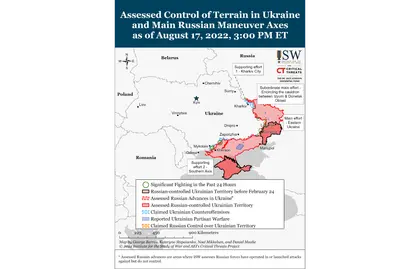Key Takeaways
- Russian military leadership is falsely claiming that recent attacks on Russian military objects in Crimea are terrorist attacks to deflect calls to designate Russia as a state sponsor of terrorism.
- Russian forces attempted several unsuccessful assaults near the Kharkiv-Donetsk Oblast border in tactically challenging forest areas.
- Russian forces continued to unsuccessfully attack settlements southeast of Siversk.
- Russian forces launched several assaults northeast and south of Bakhmut, and are likely attempting to improve tactical positions near Horlivka.
- Russian forces made limited gains northwest of Donetsk City and near the Zaporizhia-Donetsk Oblast administrative border.
- Russian forces are likely preparing to defend their ground lines of communication (GLOCs) in the Melitopol-Tokmak-Berdyansk triangle by mining settlements on the eastern Zaporizhia Oblast frontline.
- Russian federal subjects are continuing to form new volunteer units and advertise contract service while facing recruitment challenges.
- Russian occupation authorities are struggling to increase control measures in occupied territories amidst increased partisan activity.
Russian military leadership is likely increasingly losing confidence in the security of Crimea following recent Ukrainian strikes on Russian military objects in Crimea. Russian sources reported on August 17 that Vice Admiral Viktor Sokolov had replaced Admiral Igor Osipov as the commander of the Crimean-based Black Sea Fleet (BSF).[1] The Russian information space, however, was evidently eager to maintain a high level of secrecy regarding Sokolov’s appointment due to the claimed threat of “terrorist danger” in Sevastopol.[2] Recent Ukrainian strikes (associated with Ukrainian partisans and Ukrainian Armed Forces) on Russian military assets in Crimea, including the headquarters of the BSF in Sevastopol, have likely placed Russian forces on high alert and led to the restructuring of force composition, logistics, and leadership of the Russian grouping in Crimea in order to mitigate the impact of further strikes. Ukraine’s Main Military Intelligence Directorate, for example, reported that Russian forces are relocating dozens of fixed and rotary wing aircraft stationed in forward airfields in Crimea to areas deeper in the Crimean Peninsula and in mainland Russia.[3]
JOIN US ON TELEGRAM
Follow our coverage of the war on the @Kyivpost_official.
Russian leadership and the Russian nationalist information space have become increasingly invested in framing recent Ukrainian strikes on Russian military assets in Crimea as acts of terrorism in order to shift the information narrative away from Russian violations of international law and calls on the West to designate Russia a state sponsor of terrorism. Russian sources inaccurately described the strikes on the BSF headquarters, an ammunition depot, and the Saki Airbase as acts of terrorism. The Russian-appointed head of occupied Crimea, Sergey Askenov, claimed on August 17 that the Russian Federal Security Service (FSB) in Crimea had neutralized cells of the Hizb ut-Tahrir organization (an Islamist fundamentalist political organization that has historically been active in Central Asia and in Crimea amongst the Crimean Tatar community and is banned in Russia) in Dzhankoi and Yalta.[4] Aksenov accused the Ukrainian government of coordinating Hizb ut-Tahrir’s operations in Crimea without providing any evidence. Russian officials will likely increasingly link Ukrainian partisan attacks against occupied territories with operations conducted by organizations affiliated with Islamist extremism in an attempt to alienate the Ukrainian partisan movement from the international community and undermine Ukraine’s calls to officially designate Russia as a state-sponsor of terrorism. Attacks against legitimate Russian military targets fall well within the purview of legal use of force and are not acts of terrorism, nor is there any evidence to suggest that Islamist extremists conducted these attacks.[5]

N. Korean Troops Massed in Russia to Enter Ukraine War ’Soon’: Pentagon Chief
Authors: Karolina Hird, Kateryna Stepanenko, Angela Howard, George Barros, and Frederick W. Kagan
See the full report here.
You can also highlight the text and press Ctrl + Enter






